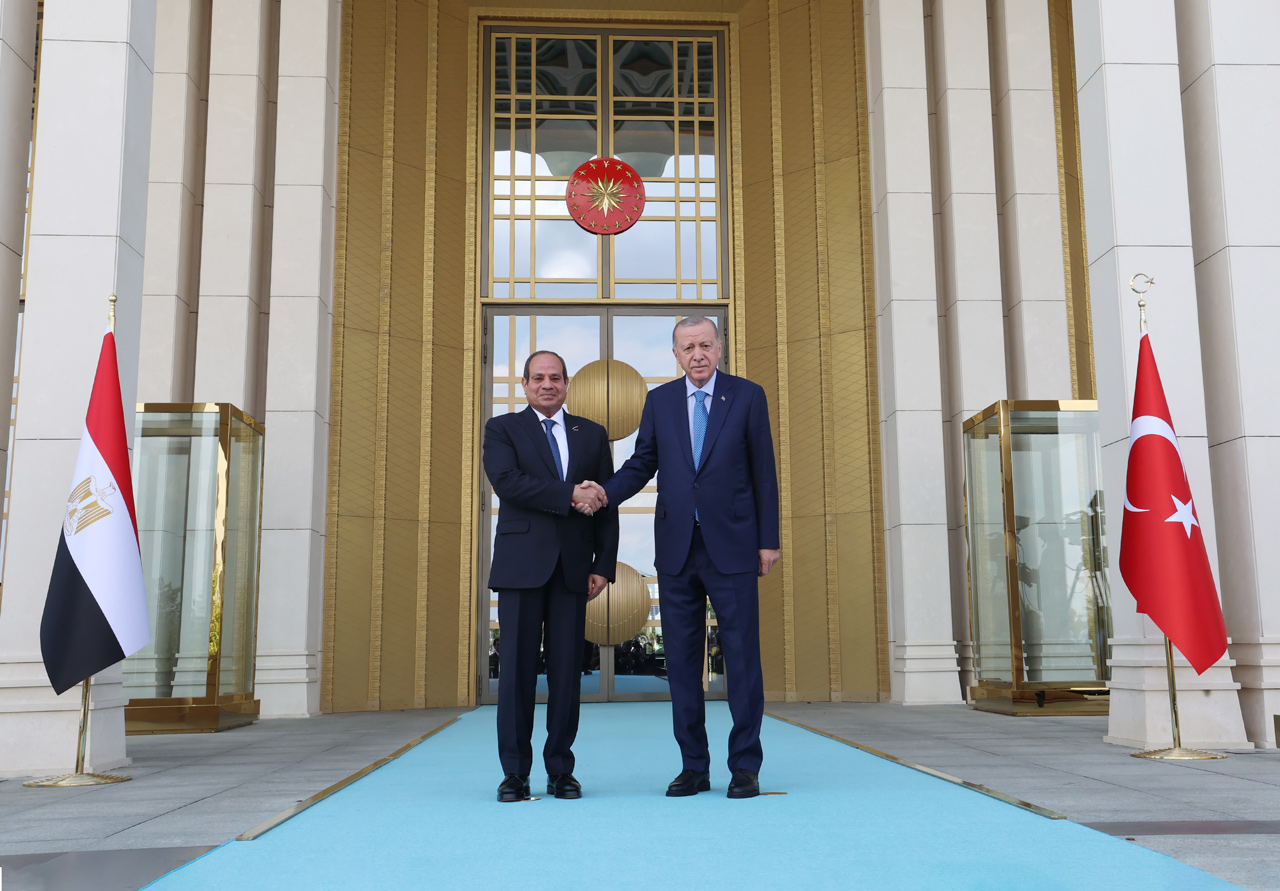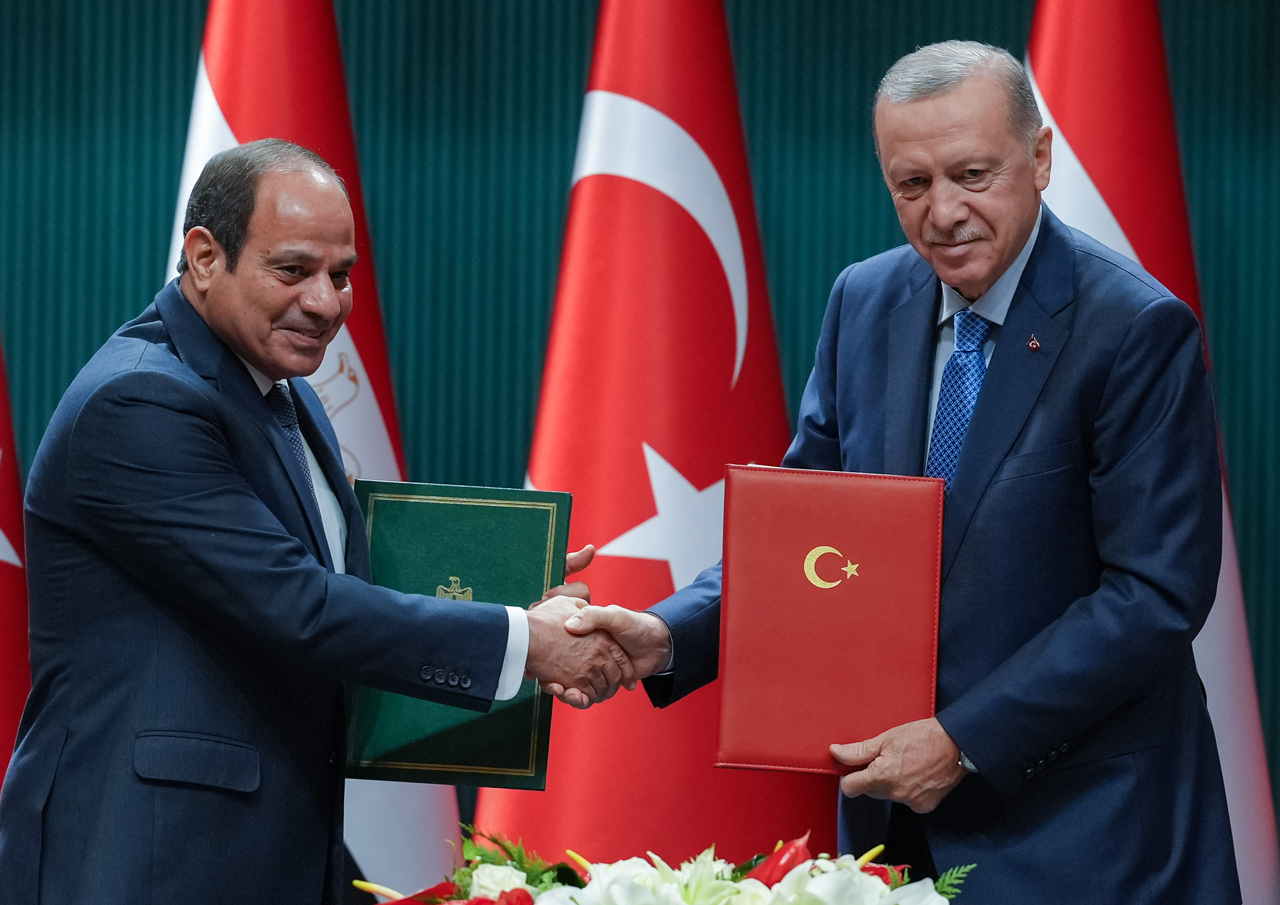Following the High-Level Strategic Cooperation Meeting between Türkiye and Egypt in Ankara on Sept. 4, 16 agreements were signed, and a 36-point joint declaration was issued. Ankara and Cairo had been at odds for nearly a decade following the bloody military coup led by Egyptian President Abdel-Fattah el-Sissi in 2013 that removed Mohammed Morsi, Egypt’s only democratic ruler, from power.
During this period of tension, the two capitals used harsh rhetoric and engaged in aggressive rivalry, as seen in the case of Libya. While trying to counterbalance Ankara in Libya, Cairo adopted an anti-Türkiye stance in the energy competition in the Eastern Mediterranean. Ankara, in turn, sought to counter Egypt’s policies by adopting a more assertive foreign policy in both Libya and the Mediterranean. The two countries have been engaged in a partly ideological and geopolitical struggle in the Middle East.
However, the grounds for dialogue were never completely severed. Economic relations served as a vital link during this period of tension, and relations continued at the level of foreign ministers and intelligence diplomacy. In 2022, during the World Cup in Doha, Qatar’s capital, a psychological threshold was crossed when President Recep Tayyip Erdoğan and el-Sissi met under Qatar’s mediation. This meeting resulted in both countries deciding to reappoint their ambassadors. After Erdoğan’s historic visit to Egypt in February 2024, an important step was taken in the normalization process, with Türkiye-Egypt relations returning to the rational foundation they had before 2013. The visit of el-Sissi to Ankara on Sept. 4 appears to have fully initiated the new era in relations.
Changing dynamics
Türkiye-Egypt relations are strategically important in many aspects in this new era. Compared to the pre-2013 period, new dynamics now define the strategic framework of their relations. This new strategic framework and geopolitical environment are among the key drivers behind the normalization of Türkiye-Egypt relations.
Compared to 2013, the Middle East and North Africa (MENA) region has evolved regarding its strategic environment. While the dynamic and confrontational atmosphere resulting from the Arab Spring has largely shifted, there are significant differences in the regional positioning of both countries since the end of the Arab Spring. Though not a core structural dynamic in Türkiye-Egypt relations, Libya is now one of the most critical issues in the new era. Against Egypt’s strong military and diplomatic position in eastern Libya, Türkiye has emerged as a key military power and political actor in western Libya. The corrosive military and political rivalry between the two nations could lead to a conflict without a clear victor in Libya. As a result, neither Ankara can pursue a strategy that disregards Cairo, nor can Cairo afford to ignore Ankara in Libya.
In the Eastern Mediterranean, the regional environment has changed significantly. Türkiye has emerged as a much more influential actor in terms of military, economic and political power. Egypt, on the other hand, plays a critical role in energy geopolitics. Especially in terms of maritime jurisdictions in the Mediterranean, both countries are key players. Excluding Israel, Türkiye-Egypt relations must be recalibrated within a new framework shaped by the regional normalization that began in the 2020s. In this context, Türkiye’s normalization of relations with the UAE and Saudi Arabia has facilitated Ankara-Cairo normalization.
Similarly, Qatar’s inclusion in the intra-Gulf normalization process and the end of confrontational periods have catalyzed Ankara-Cairo relations. After Oct. 7, 2023, Israel’s destabilizing role in the region has brought the military and diplomatic significance of Egypt and Türkiye in the Arab geopolitical basin to the forefront. Before Oct. 7, the Palestinian issue had a different strategic meaning for the two countries than it does today. The ongoing Israeli genocide in Gaza is not merely a border security issue for Egypt, nor is it solely a humanitarian crisis for Ankara; both nations view Israeli aggression in Gaza and Palestine as a matter of regional and national security.
Perhaps the most important strategic variable in the relations between Türkiye and Egypt is Türkiye’s role in Africa, particularly in the Horn of Africa. As Türkiye has recalibrated its role in North Africa, East Africa and the Sahel region, it has deepened its strategic reach. Egypt, in turn, has had to redefine its strategic priorities, particularly in North Africa and the Horn of Africa. The Sudanese civil war, the disputes between Egypt and Ethiopia, and the increased risk of military and political conflict between Somalia and Ethiopia are structural dynamics that strategically affect Türkiye-Egypt relations. In this regard, cooperation between Ankara and Cairo stands out as a strategic necessity.
The strategic framework
Considering the new regional dynamics, Türkiye-Egypt relations have become strategic. The 36-point joint declaration issued during el-Sissi’s visit to Ankara reflects the strategic nature of bilateral ties. It is clear that relations between the two countries are shaped by multiple strategic frameworks, including diplomacy, economic and trade cooperation, sectoral collaboration, environment and climate initiatives, security and defense, social policies, regional stability and conflict resolution.
In economic relations, the $15 billion (TL 508 billion) trade volume target offers both countries opportunities to address their financial challenges. Türkiye’s economic strength creates investment opportunities for Egypt and provides the potential for expanding the size of the Turkish economy. In the field of security and defense, both countries rank among the top two military powers in the region. Türkiye’s advancements in the defense industry enhance its military capabilities and offer other countries the chance to benefit from military innovation and technology transfer. Regional countries seeking to increase their strategic autonomy in defense are leveraging Türkiye’s competitive defense industry for their own national security and direct procurement. Each new diplomatic engagement allows Ankara to consolidate its position in both the global and regional defense markets.
The most critical aspect of the multidimensional strategic nature of Türkiye-Egypt relations is regional stability and conflict resolution. The bilateral relationship is intertwined with multi-actor, complex regional issues, such as those in Libya, Sudan, Somalia, Ethiopia, Gaza, Syria and Iraq.
Necessity for cooperation
With el-Sissi’s visit to Ankara, the final normalization stage between Türkiye and Egypt has been completed. However, the real question is how the two capitals can collaborate in addressing the aforementioned regional challenges through a problem-solving approach that pools their interests. Libya remains one of the most significant challenges in their relations. Cairo views Ankara’s role in Libya with skepticism, particularly its troop presence. Meanwhile, Ankara sees Egypt as a crucial actor in resolving the Libyan issue but does not favor any solution that would diminish its diplomatic and military influence. Both nations aim to achieve political stability and preserve Libya’s territorial integrity as soon as possible, requiring them to adopt a win-win formula and make mutual concessions.
Another area of focus is the ongoing developments in the Horn of Africa. The Somaliland issue between Somalia and Ethiopia allows Ankara and Cairo to collaborate. Türkiye is facilitating the resolution of the conflict between Somalia and Ethiopia while maintaining a balanced policy in its relations with both countries. Conversely, Cairo sides with Somalia in the face of Ethiopia’s ongoing Renaissance Dam project and its strategy of gaining access to the Red Sea through Somaliland. Military and defense relations between Somalia and Egypt may also deepen in the near future. Therefore, Ankara and Cairo could contribute to resolving the conflict by acting jointly to address issues in the Horn of Africa.
An equally important issue is the resolution of the ongoing war in Gaza. Both countries share the view that the ongoing genocide in Gaza must stop, a sustainable ceasefire should be declared, humanitarian aid must reach Gaza, the region must be rebuilt, Israel must withdraw from Gaza, and an independent Palestinian state must be established based on the 1967 borders. Egypt is also an active player in the Gaza negotiations. The two countries’ diplomatic efforts to pressure Israel into a ceasefire could align Ankara and Cairo toward a common goal. The real test will be the extent to which they cooperate in forming new regional partnerships and alliances centered around the Palestinian issue post-ceasefire.
In conclusion, the new strategic framework of Türkiye-Egypt relations requires both nations to act cautiously, develop mechanisms to shield their relations from regional crises and establish new foreign policy, security, defense and intelligence architecture to institutionalize their partnership.
[Daily Sabah, Sptember 8, 2024]









